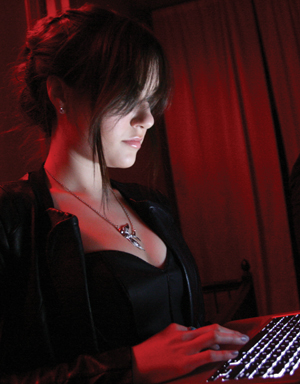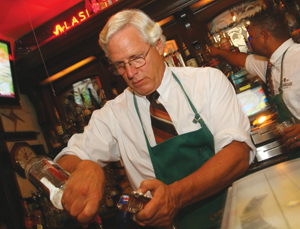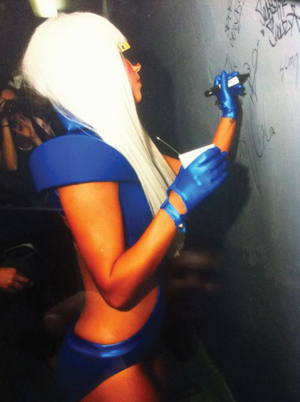

It’s a fitting metaphor for the state of the club scene that the venue of the moment is an unadvertised Prohibition Era-themed speakeasy that’s in a basement on San Salvador Street. The only signage is a barrel affixed to the brick wall to identify the entrance. Under the barrel, a bouncer in beret, vest and suspenders asks prospective patrons to speak in soft tones and turn their cell phone ring to silent. They wait patiently at street level for a chance to descend to the bar, where they’ll be interviewed about what flavors they enjoy. The club scene has gone underground.
Searchlights, velvet ropes and plastic-coated flyers jammed into auto window seals are as passe as Hummer limos. It’s all about the secret places, the back alleys, the rooftops, the nooks and crannies now. Maybe you’ll be asked to walk down the hallway that leads to the service bar in the kitchen at Sabor, past the Lady Gaga autograph. Or ride the elevator to the Capital Club on the 17th Floor, where a members-only bar commands a view of the valley’s east, north and west.
Maybe you’ll find out about the hidden rooms at Paolo’s or CB Hannegan’s, or get invited to an event at an exclusive club like the Sainte Claire Club, the Silver Creek Valley Country Club or the Stanford Faculty Club, where you could bump into an ex-president.
You might find yourself drinking cab in a Willow Glen garage, next to a Ferrari and an oil painting of a hunting scene or afterpartying with 12-packs in a sound-insulated Northside basement outfitted for DJ parties. Or the location could be the designer ultralounge in the basement of the $30 million Los Altos Hills residence of LSI founder Wilf Corrigan. Or the rooftop of Liquid Agency, which was the best place to see the Grand Prix and had a DJ as well. Or an illegal party in a Japantown cannery warehouse.


Silicon Valley has many great places to enjoy a drink and social interaction. As is Metro’s custom, we survey the lot and report on the state of the valley’s public houses and the evolution of its nightlife culture. This issue is a celebration and an annual rite. So, cheers!
For much of this century’s first decade, Silicon Valley’s biggest city was the weekend destination of choice for an audience that spanned a wide swath of Northern and Central California. With the region’s largest concentration of nightclubs, celebrities from the sports and entertainment spheres showed up to perform and party. Then the party was busted up.
Under Police Chief Bill Lansdowne and his teetotaling successor Rob Davis, San Jose police came down hard on nightclubs, in coordination with a phalanx of regulators—planning, fire and alcoholic beverage control. They were aligned with developers and a political leadership that fantasized about selling high-rise downtown luxury condos to empty-nesters.
The condos didn’t sell, but the enforcement worked so well that clubs went dark and tax revenues shriveled. The enforcers did their job so well, they worked themselves out of a job. Retirements, layoffs and pay cuts followed.
It was a second act to the late 1980s, when the city council shut down the adult businesses in what became the SoFA entertainment zone. The cyclops eyeball will, no doubt, next focus on thinning the ranks of tax producing cannabis dispensaries. We’re not a sex, drugs and rock & roll kind of town, City Hall seems to believe.
History has taught us that prohibitions don’t work, and the parties just moved elsewhere. Some San Jose promoters moved to San Francisco, Los Angeles or Las Vegas, or went into other lines of work. A lively nightlife scen sprouted up in Campbell, where lines spill out the door for sangria-swirled margaritas. The Detox party moved from San Jose to Milpitas, where the city has thrown out the welcome mat.
Meanwhile, the historic former theater that Polly Esther’s, Cabana, Glo and Wet previously occupied is now being transformed into a rock climbing gym. Club Miami is an Irish business development center. The SoFA landmark that once housed the Pussycat Theater before becoming the pioneering club F/X, then The Usual and later Angels sits empty. The SoFA Lounge (previously Ajax and Beehive) was shuttered over fire code issues. The Vault Ultralounge keeps its doors locked. Paradise Beach Club —later Club Wild and Ambassadors — has gone silent as well.
Maybe one of the budget crunchers at 200 East Santa Clara Street will get tired of cutting workers’ pay and figure out that a fun city is a prosperous city. Closed clubs don’t pay taxes and the things that modern people do will continue, though it might be in another jurisdiction or in a private venue, without the economic benefits that occur when the synergies of urban life are allowed to play out.
As always, valley folks manage to enjoy themselves, whichever way the pendulum swings. Party on!
Tales from the Club
The stories that make the South Bay’s live-music masterminds ask, ‘What just happened?’
Check back soon for our comlete 2011 Bar & Club listings.



